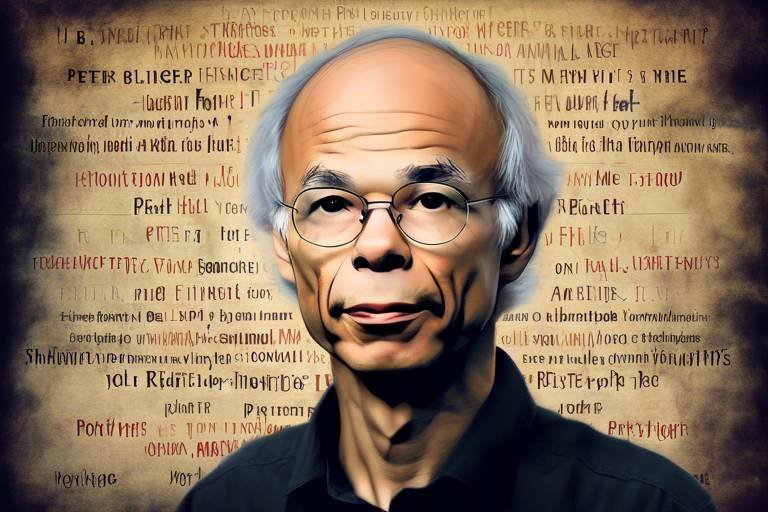Ayn Rand's Objectivism - Delving Deeper into the Philosophy
Ayn Rand's Objectivism is not just a philosophy; it's a bold declaration of the individual’s right to exist and thrive. At its core, Objectivism champions the idea that reality is objective and that individuals are capable of understanding it through reason. This philosophy emerged in the mid-20th century, a time marked by significant political and social upheaval, where traditional values were being challenged and redefined. Rand's work serves as a counterpoint to collectivist ideologies, emphasizing personal responsibility and the pursuit of one's own happiness as the ultimate moral aim.
But what exactly does Objectivism entail? It’s a complex framework that integrates various aspects of human life, including ethics, politics, and art. Rand’s philosophy is built on several key tenets that together create a comprehensive worldview. For instance, the importance of rational self-interest is paramount, as it posits that individuals should act in accordance with their own values and goals. This principle not only promotes personal achievement but also fosters a society where cooperation and innovation can flourish.
Moreover, Objectivism is deeply rooted in the concept of individual rights. Rand argues that each person has the right to pursue their happiness without hindrance from others, including the government. This notion is critical in her political philosophy, which advocates for a system of laissez-faire capitalism—a free market that allows individuals to trade and interact voluntarily. In Rand's view, such a system is essential for protecting individual freedoms and enabling personal growth.
In addition to its ethical and political dimensions, Objectivism also extends into the realm of art. Rand believed that art should not merely reflect reality but should also inspire individuals by portraying human potential and achievement. Through her concept of romantic realism, she argued that art should celebrate the best of humanity, providing a vision of what is possible when individuals strive for greatness.
In summary, Ayn Rand's Objectivism offers a radical perspective on human existence, urging individuals to embrace their rational nature, pursue their own happiness, and recognize the importance of individual rights. This philosophy continues to resonate today, challenging us to rethink our values and the role of government in our lives.
- What is Objectivism?
Objectivism is a philosophical system developed by Ayn Rand that emphasizes reason, individualism, and capitalism.
- What are the main principles of Objectivism?
The main principles include rational self-interest, individual rights, and the advocacy for laissez-faire capitalism.
- How does Objectivism view altruism?
Objectivism critiques altruism as a moral framework that can undermine individual potential and societal progress.
- What is the role of government in Objectivism?
The government's role is limited to protecting individual rights, enforcing contracts, and maintaining national defense.
- How does Objectivism relate to art?
Rand believed that art should reflect human values and ideals, serving as a source of inspiration and affirmation of individual achievement.

The Origins of Objectivism
The philosophy of Objectivism was born out of the tumultuous backdrop of the early 20th century, a time marked by significant social, political, and economic upheaval. Ayn Rand, a Russian émigré, fled the chaos of the Bolshevik Revolution and arrived in America with a unique perspective shaped by her experiences. This historical context is crucial in understanding how Objectivism emerged as a response to the collectivist ideologies gaining traction in both Europe and the United States.
Rand's early life in Russia exposed her to the harsh realities of a society that prioritized the collective over the individual. The oppressive nature of communism, which she witnessed firsthand, instilled in her a profound appreciation for individual rights and personal freedom. This experience became the bedrock of her philosophical beliefs, as she sought to articulate a vision of a society where individuals could thrive based on their own merits.
In the 1930s and 1940s, Rand began to develop her philosophical ideas more formally. She published her first major novel, We the Living, in 1936, which illustrated the struggles of individuals against a totalitarian regime. This work was not merely a story but a philosophical statement that laid the groundwork for her later writings. Following this, her magnum opus, Atlas Shrugged, published in 1957, encapsulated her philosophy in a narrative form, showcasing the importance of rational self-interest and the dangers of collectivism.
Rand's philosophy stands in stark contrast to other philosophical movements of her time, particularly existentialism and behaviorism, which often emphasized subjective experience or external conditioning over rational thought and individual agency. While existentialists like Jean-Paul Sartre focused on the absurdity of existence and the burden of choice, Rand championed the idea that individuals could and should use reason as their primary means of understanding the world and achieving their goals.
Moreover, Objectivism draws heavily from the principles of Aristotelian philosophy, particularly the emphasis on reality as an objective entity that can be understood through reason. Rand's assertion that "reality exists as an absolute" underlines her belief that individuals must recognize the world as it is, rather than how they wish it to be. This foundational principle not only set the stage for her ethical and political theories but also positioned Objectivism as a radical departure from the prevailing philosophical trends of her time.
In summary, the origins of Objectivism are deeply rooted in Ayn Rand's personal history and the philosophical landscape of her era. By critically engaging with the ideas of her contemporaries and drawing inspiration from classical philosophy, Rand crafted a comprehensive worldview that champions the individual, reason, and the pursuit of happiness. Her philosophy continues to spark debate and discussion, making it a vital part of the intellectual discourse in modern society.
- What is Objectivism? Objectivism is a philosophical system developed by Ayn Rand that emphasizes reason, individualism, and the pursuit of one's own happiness as the moral purpose of life.
- How does Objectivism view altruism? Objectivism critiques traditional altruism, arguing that self-sacrifice undermines individual potential and societal progress.
- What role does government play in Objectivism? In Objectivism, the government's role is limited to protecting individual rights, enforcing contracts, and maintaining national defense.
- How does Objectivism relate to art? Rand believed that art should reflect reality and express human values, serving as a means of communication and inspiration.

Core Principles of Objectivism
The philosophy of Objectivism, as articulated by Ayn Rand, is built upon a foundation of several core principles that challenge conventional thinking and invite individuals to rethink their values and beliefs. At its heart, Objectivism emphasizes the importance of rational self-interest, the nature of reality, and the sanctity of individual rights. These principles not only form the backbone of Rand's ideology but also serve as a lens through which we can examine our own lives and societal structures.
One of the most striking aspects of Objectivism is its assertion that the pursuit of one's own happiness is not just a personal goal but a moral imperative. This idea of rational self-interest encourages individuals to prioritize their own needs and desires, creating a stark contrast to traditional ethical frameworks that often emphasize self-sacrifice and altruism. Rand posits that by pursuing personal happiness, individuals contribute to the greater good, as their achievements can lead to innovations and societal advancements.
Another fundamental tenet of Objectivism is the belief in the objective nature of reality. Rand argues that reality exists independent of consciousness, meaning that facts are facts, regardless of individual beliefs or perceptions. This principle underscores the importance of reason as the only means of acquiring knowledge. In a world where subjective interpretations often cloud judgment, Objectivism champions the idea that we must rely on our rational faculties to navigate our lives and make informed decisions.
Furthermore, Objectivism places a significant emphasis on individual rights. Rand asserts that every person has the right to pursue their own happiness without interference from others, including the government. This notion of individual rights is not merely a societal construct but a fundamental aspect of human nature. It implies that each person is an end in themselves, deserving of respect and autonomy. This perspective lays the groundwork for Rand's political philosophy, advocating for a system that protects these rights through limited government intervention.
To illustrate these core principles further, consider the following table that highlights the key tenets of Objectivism alongside their implications:
| Core Principle | Description | Implications |
|---|---|---|
| Rational Self-Interest | The pursuit of one's own happiness as a moral imperative. | Encourages personal achievement and societal progress. |
| Objective Reality | Reality exists independent of consciousness and must be understood through reason. | Promotes rational thinking and informed decision-making. |
| Individual Rights | Each person has the right to pursue their own happiness without interference. | Supports limited government and personal freedom. |
In summary, the core principles of Objectivism challenge us to embrace our own rational self-interest, acknowledge the objective nature of reality, and uphold individual rights. By doing so, we can foster a society that not only respects personal freedom but also encourages innovation and progress. Rand's philosophy invites us to reconsider our roles as individuals and to pursue our happiness boldly, reshaping our understanding of ethics, politics, and art in the process.
- What is Objectivism? - Objectivism is a philosophical system developed by Ayn Rand that emphasizes rational self-interest, objective reality, and individual rights.
- How does Objectivism view altruism? - Objectivism critiques altruism, arguing that self-sacrifice undermines human potential and societal progress.
- What role does government play in Objectivism? - In Objectivism, the government's role is limited to protecting individual rights and maintaining national defense.

Rational Self-Interest
At the heart of Ayn Rand's philosophy lies the concept of , which serves as a guiding principle for individuals seeking to achieve their own happiness. Unlike the traditional views that often equate self-interest with selfishness or greed, Rand redefines it as a moral imperative. Imagine a world where everyone is encouraged to pursue their own passions and goals—this is the essence of rational self-interest. It’s about making choices that not only benefit oneself but also contribute positively to society.
Rational self-interest is not merely about acting on whims or immediate desires; it’s about using reason to identify what truly enhances one’s life. Rand argues that every action should be guided by a clear understanding of one’s values and long-term objectives. This contrasts sharply with the altruistic notion that one must sacrifice personal happiness for the sake of others. In fact, Rand believed that when individuals prioritize their own well-being, they are more likely to engage in voluntary cooperation with others, leading to a more harmonious society.
To illustrate this point, consider the following aspects of rational self-interest:
- Personal Responsibility: Individuals are responsible for their own choices and outcomes, fostering a sense of accountability.
- Long-term Vision: Rational self-interest encourages individuals to think ahead, planning for future success rather than seeking instant gratification.
- Mutual Benefit: Engaging in relationships and transactions that are beneficial to all parties involved creates a win-win scenario.
Rand’s emphasis on rational self-interest also challenges the notion that morality requires self-sacrifice. Instead, she posits that true morality is about the pursuit of one’s own happiness, which can coexist with the happiness of others. For instance, when entrepreneurs innovate and create products that improve lives, they are acting in their own self-interest while simultaneously benefiting society. This interplay between personal gain and societal progress is crucial in understanding how rational self-interest operates within the framework of Objectivism.
Moreover, Rand’s philosophy encourages individuals to reject the guilt often associated with pursuing personal goals. She argued that feeling guilty for wanting to succeed or for aiming for happiness is a distortion of moral values. Instead, embracing rational self-interest is liberating; it allows individuals to fully realize their potential and contribute to the world in meaningful ways. In this light, rational self-interest becomes not just a personal choice but a societal necessity that drives innovation, creativity, and progress.
In summary, rational self-interest is a foundational concept in Objectivism that redefines the way we perceive our personal goals and interactions with others. By prioritizing one’s own happiness through reasoned choices, individuals not only elevate their own lives but also foster a society that thrives on cooperation and mutual respect. It’s a philosophy that champions the idea that when you pursue your own happiness, you’re ultimately contributing to the greater good.
- What is rational self-interest? Rational self-interest is the principle that individuals should act in ways that promote their own happiness and well-being, guided by reason and long-term goals.
- How does rational self-interest differ from selfishness? While selfishness often implies a disregard for others, rational self-interest encourages actions that can benefit both oneself and others through mutual cooperation.
- Can rational self-interest lead to social cooperation? Yes, by pursuing personal goals, individuals can create opportunities for collaboration and innovation that ultimately benefit society as a whole.
- Why is rational self-interest important in Objectivism? It serves as the ethical foundation of Objectivism, promoting the idea that individuals have the right to pursue their own happiness without guilt or sacrifice.

The Ethics of Self-Interest
When we dive into the ethics of self-interest, we're stepping into a realm that challenges many conventional ideas about morality. Ayn Rand, the brilliant mind behind Objectivism, posits that pursuing one's own happiness is not just acceptable, but a moral imperative. This perspective flips the traditional view of altruism on its head, suggesting that self-sacrifice is often glorified at the expense of individual potential. Imagine a world where everyone is encouraged to chase their dreams and fulfill their desires—sounds liberating, doesn’t it?
At the core of Rand's argument is the belief that self-interest is not synonymous with selfishness in the negative sense. Instead, it is about recognizing that each person has their own goals, aspirations, and values, which should be pursued vigorously. This approach acknowledges that when individuals strive for their own happiness, they often contribute positively to society as a byproduct. Consider how entrepreneurs innovate and create jobs; their self-interest fuels economic growth, which benefits everyone.
Rand argues that the pursuit of self-interest can coexist with social cooperation, creating a harmonious society where mutual benefit is achievable. This idea can be illustrated through various examples:
- When a person invests time and resources into their education, they not only improve their own life but also contribute to the community by becoming a knowledgeable individual.
- Artists who pursue their craft for personal fulfillment often inspire others, creating a ripple effect of inspiration and creativity.
- Business leaders who seek profit through ethical means provide goods and services that enhance the quality of life for others.
This perspective on ethics challenges us to rethink our understanding of morality. Rand emphasizes that morality should be about enhancing life, not diminishing it through self-sacrifice. She argues that the traditional view of altruism often leads to a sense of guilt for pursuing one's own happiness, which can be detrimental to both the individual and society at large.
In essence, the ethics of self-interest as proposed by Rand encourages individuals to embrace their passions and ambitions while recognizing that this pursuit can lead to a more prosperous and fulfilling society. By prioritizing personal happiness, we can ultimately create a world where everyone has the opportunity to thrive. This is not just a philosophical stance; it is a call to action for all of us to take charge of our destinies and live authentically.
- What is the main idea behind the ethics of self-interest?
The main idea is that pursuing one's own happiness is a moral imperative, and this pursuit can lead to positive societal outcomes. - How does Rand's view on self-interest differ from traditional altruism?
Rand challenges the notion that self-sacrifice is virtuous, arguing instead that individuals should prioritize their own goals and happiness. - Can self-interest coexist with social cooperation?
Yes, Rand believes that when individuals pursue their own interests, they often contribute to the welfare of society, creating a win-win scenario.

Critiques of Altruism
Ayn Rand's critique of altruism is not merely a rejection of selflessness; it is a bold declaration that challenges the very foundation of how we perceive morality. In her view, traditional altruism, which promotes the idea that individuals should sacrifice their own interests for the sake of others, is fundamentally flawed. Rand argues that this ideology undermines human potential and societal progress by encouraging self-neglect and diminishing personal responsibility. Imagine a world where individuals are constantly told to put others first—what happens to their own dreams and aspirations? They often get lost in the shuffle, leading to a society where mediocrity becomes the norm rather than the exception.
Rand's philosophy asserts that the pursuit of one’s own happiness is not only a personal goal but a moral imperative. She believes that when individuals prioritize their own interests, they are better equipped to contribute to society. This perspective flips the altruistic narrative on its head, suggesting that self-interest can coexist harmoniously with social cooperation. In her eyes, when people seek their own happiness, they inadvertently create value for others, fostering a more prosperous community. For instance, consider an entrepreneur who creates a successful business. Their pursuit of profit not only fulfills their personal ambitions but also provides jobs, products, and services that benefit countless others.
To illustrate her point, Rand often uses the metaphor of a candle. If one candle lights another, it does not diminish its own flame; instead, it creates a brighter environment for all. In this way, Rand argues that self-interest can illuminate the path for others without extinguishing one’s own light. This perspective invites us to reconsider the implications of altruism on human achievement. If we are constantly sacrificing our own needs, how can we ever hope to reach our full potential?
Critics of Rand’s philosophy often assert that her rejection of altruism promotes selfishness. However, Rand clarifies that she does not advocate for a lack of concern for others; rather, she emphasizes that genuine concern should stem from a place of rational self-interest. This means that acts of kindness and generosity should not be coerced by societal pressures but should arise naturally from one’s own values and desires. In essence, Rand's critique of altruism opens up a dialogue about the true nature of morality and the importance of recognizing individual rights and freedoms.
In conclusion, Rand's arguments against altruism spark important conversations about the balance between self-interest and social responsibility. By challenging conventional moral frameworks, she invites us to reflect on the implications of our choices and the values we hold dear. Are we truly helping others when we neglect our own needs, or are we simply perpetuating a cycle of mediocrity? The answers to these questions may very well shape the future of ethical thought.
- What is Objectivism?
Objectivism is a philosophical system developed by Ayn Rand that emphasizes rational self-interest, individual rights, and the pursuit of one's own happiness as the highest moral purpose.
- Why does Ayn Rand criticize altruism?
Rand critiques altruism because she believes it undermines individual potential and promotes self-sacrifice, which she argues is detrimental to both personal fulfillment and societal progress.
- How does Objectivism view government?
Objectivism advocates for a limited government whose primary role is to protect individual rights, enforce contracts, and maintain national defense, contrasting with more interventionist political philosophies.
- What is Romantic Realism in art?
Romantic Realism is a concept championed by Rand that combines realistic portrayals of life with an emphasis on idealized characters, illustrating her belief in the potential for greatness within humanity.

Individual Rights
The concept of lies at the heart of Ayn Rand's Objectivism, serving as a fundamental pillar that supports her broader philosophical framework. Rand argues that every person possesses inherent rights simply by virtue of being human. These rights are not granted by society or government; rather, they are a natural extension of an individual's existence and their capacity for rational thought. In essence, individual rights are the moral principles that govern a person's freedom to act in pursuit of their own happiness, free from coercion or interference.
Rand categorically asserts that the most essential individual right is the right to life. This includes the right to make choices, to think, to create, and to engage in trade with others. She emphasizes that these rights are not merely privileges bestowed upon individuals but are essential for their survival and flourishing. Without the recognition of individual rights, Rand argues, society risks descending into tyranny, where the collective will tramples on the rights of the individual. This is a stark reminder of the importance of safeguarding personal freedoms in any political system.
Moreover, Rand's philosophy delineates the distinction between rights and desires. While everyone is entitled to their own desires, not all desires translate into rights. For instance, the desire to take from others or to impose one’s will upon them does not constitute a legitimate right. Instead, rights are about ensuring that individuals can pursue their own goals without infringing on the rights of others. This mutual respect for individual rights creates a framework where cooperation and social harmony can thrive.
To further illustrate the concept of individual rights, consider the following key points:
- Inviolability: Individual rights are inviolable; they cannot be surrendered or taken away without consent.
- Self-Ownership: Each person owns their own life, body, and mind, making them the ultimate authority over their own choices.
- Non-Aggression Principle: The initiation of force against others is fundamentally wrong, as it violates their individual rights.
In the realm of politics, Rand's emphasis on individual rights leads her to advocate for a system that protects these rights through a limited government. She believes that the only legitimate function of government is to safeguard the rights of individuals, ensuring that no one can infringe upon another's freedom. This perspective sharply contrasts with collectivist ideologies that prioritize the group over the individual, often leading to the erosion of personal liberties.
In summary, the notion of individual rights in Objectivism is not just a theoretical construct; it is a call to action. It urges individuals to recognize their own worth and to stand firm against any force that seeks to undermine their freedoms. By championing individual rights, Rand lays the groundwork for a society where personal achievement is celebrated, and each person is free to pursue their own path to happiness. This philosophy resonates deeply in today’s world, where the balance between individual freedom and societal demands continues to be a hotly debated topic.
- What are individual rights according to Ayn Rand?
Individual rights are moral principles that protect each person's freedom to act in pursuit of their own happiness without interference from others. - How does Rand differentiate between rights and desires?
Rand argues that while everyone has desires, not all desires constitute rights. Rights must respect the freedom of others and cannot involve the coercion of individuals. - What role does government play in protecting individual rights?
In Rand's view, the government's role is limited to protecting individual rights, enforcing contracts, and maintaining national defense, thus ensuring a framework for personal freedom.

Objectivism in Politics
When we dive into the realm of politics through the lens of Objectivism, we uncover a distinctive philosophy that champions individual rights and freedoms above all else. Ayn Rand, the architect of this ideology, fervently argued that the essence of a free society lies in the protection of these rights. But what does this actually mean in practical terms? At its core, Objectivism advocates for a political system that prioritizes laissez-faire capitalism and a minimal government role. This isn't just a theoretical framework; it's a call to action that resonates with many who believe in the power of the individual.
Rand's vision of laissez-faire capitalism is rooted in the idea that free markets are the best means of promoting innovation and personal success. She believed that when individuals are free to pursue their own interests, they naturally contribute to the prosperity of society as a whole. This is akin to a garden where each flower blooms at its own pace, contributing to the beauty of the entire landscape. In such a system, individuals are incentivized to create, produce, and trade, which in turn fosters an environment ripe for growth and opportunity.
Moreover, the role of government, according to Objectivism, is not to regulate or control but to protect individual rights. This includes enforcing contracts and maintaining national defense, ensuring that the freedom of individuals is not infringed upon by others. Imagine a referee in a sports game whose sole job is to ensure fair play; this is how Rand envisioned the government's function. It should step in only when rights are violated, allowing individuals to operate freely within the bounds of their own choices.
| Key Principles of Objectivism in Politics | Description |
|---|---|
| Laissez-Faire Capitalism | A system where the government has minimal intervention in the economy, allowing free markets to operate. |
| Individual Rights | The belief that each person has the right to pursue their happiness without interference from others. |
| Limited Government | The idea that the government's role should be restricted to protecting rights and ensuring justice. |
This philosophy starkly contrasts with more interventionist political ideologies, which often advocate for extensive government control over various aspects of life. Critics of Objectivism argue that such a hands-off approach could lead to inequality and exploitation. However, Rand countered this by asserting that true equality comes not from equal outcomes but from equal rights. In her view, the pursuit of one's own happiness is a fundamental right that should be protected, not hindered.
In essence, Objectivism in politics is not just about economic systems; it's about a profound respect for the individual. It challenges us to rethink the role of government and the nature of human relationships. Are we better off when the government plays a larger role in our lives, or do we thrive when we are free to make our own choices? These questions lie at the heart of Rand's political philosophy, inviting us to engage in a deeper discussion about freedom, responsibility, and the essence of a just society.
- What is Objectivism? - Objectivism is a philosophical system developed by Ayn Rand that emphasizes rational self-interest, individual rights, and laissez-faire capitalism.
- How does Objectivism view the role of government? - Objectivism advocates for a limited government whose primary role is to protect individual rights and maintain national defense.
- Is altruism compatible with Objectivism? - Ayn Rand criticized altruism, arguing that it often undermines individual potential and happiness.
- What is laissez-faire capitalism? - It is an economic system where the government has minimal intervention, allowing free markets to operate and individuals to pursue their own interests.

Laissez-Faire Capitalism
Ayn Rand's unwavering support for is not just a casual endorsement; it is deeply rooted in her philosophical framework of Objectivism. She believed that a free market is the most effective means of fostering innovation and individual success. In her view, the essence of capitalism lies in its ability to allow individuals to pursue their own interests, which, in turn, leads to societal advancement. Imagine a bustling marketplace where each person is free to trade, create, and innovate without the heavy hand of government interference. This vibrant scene is what Rand envisioned as the ideal economic landscape.
At the heart of laissez-faire capitalism is the principle that the economy functions best when individuals are allowed to operate freely. Rand argued that when people are free to make their own choices regarding production, consumption, and trade, they naturally gravitate towards activities that maximize their own happiness and prosperity. This is akin to a garden flourishing when given the right conditions—sunlight, water, and space to grow. In this economic ecosystem, competition drives quality and efficiency, resulting in products and services that benefit all.
Rand's advocacy for laissez-faire capitalism also stems from her belief in the importance of individual rights. She posited that the government should not interfere in the marketplace, as such interference can lead to a violation of personal freedoms. Instead, she argued for a government whose role is strictly limited to protecting these rights, enforcing contracts, and ensuring national defense. This minimalist approach to governance contrasts sharply with more interventionist philosophies that seek to regulate or control economic activity.
To illustrate her point, consider the following table that outlines the key differences between laissez-faire capitalism and interventionist economic models:
| Aspect | Laissez-Faire Capitalism | Interventionist Models |
|---|---|---|
| Government Role | Minimal, focused on protection of rights | Active, involved in economic regulation |
| Market Control | Free market dynamics | Price controls and quotas |
| Innovation | Encouraged through competition | Often stifled by regulations |
| Individual Freedom | High, with personal choice | Limited by government mandates |
Ultimately, Rand’s vision of laissez-faire capitalism is not merely an economic theory; it is a moral imperative that champions the rights and freedoms of individuals. She believed that when people are left to their own devices, they can achieve remarkable things, contributing to a society that thrives on creativity and progress. This philosophy invites us to reflect on the role of government in our lives and challenges us to consider whether we truly want to live in a world where our choices are dictated by external forces rather than our own aspirations.
- What is laissez-faire capitalism?
Laissez-faire capitalism is an economic system where transactions between private parties are free from government intervention, allowing for a self-regulating market.
- How does Ayn Rand view the role of government in the economy?
Rand believed that the government's role should be limited to protecting individual rights, enforcing contracts, and maintaining national defense, without interfering in economic matters.
- Why does Rand advocate for individual rights?
Rand argues that individual rights are essential for personal freedom and happiness, allowing people to pursue their own interests and achieve their potential.
- What are the benefits of a free market according to Rand?
Rand posits that a free market fosters innovation, competition, and overall prosperity, benefiting society as individuals pursue their own happiness.

Role of Government
The role of government in Ayn Rand's Objectivism is not just a matter of political theory; it is a fundamental aspect of her philosophy that underscores the importance of individual rights and freedoms. According to Rand, the government should act as a protector of these rights, ensuring that each person can pursue their own happiness without interference. This perspective sharply contrasts with more interventionist political philosophies that advocate for significant government involvement in economic and social matters.
In Rand's view, the government has a specific and limited function. It should focus on three primary responsibilities:
- Protecting individual rights: The government must safeguard the rights of individuals to life, liberty, and property, ensuring that no one can infringe upon these rights.
- Enforcing contracts: A fair and just society relies on the enforcement of contracts, which allows individuals to engage in trade and commerce with confidence.
- Maintaining national defense: The government should provide for the common defense against external threats, ensuring the safety and security of its citizens.
Rand's opposition to extensive government intervention is rooted in her belief that such involvement stifles innovation and individual initiative. She argues that when the government oversteps its boundaries, it not only undermines personal freedom but also disrupts the natural order of a free market. For instance, excessive regulation can lead to inefficiencies and hinder the entrepreneurial spirit that drives progress and prosperity.
Moreover, Rand contends that a proper government must be based on the principles of voluntary exchange and free markets. In her eyes, capitalism is the only economic system that respects individual rights and fosters human creativity. By minimizing government interference, individuals are free to make choices that reflect their own values and goals, leading to a more dynamic and innovative society.
In conclusion, the role of government in Objectivism is pivotal and revolves around the protection of individual rights, the enforcement of contracts, and the provision of national defense. By adhering to these principles, Rand believes that society can thrive, allowing individuals to achieve their fullest potential without the shackles of unnecessary governmental control.
- What is the primary role of government according to Ayn Rand? The primary role of government is to protect individual rights, enforce contracts, and maintain national defense.
- Why does Rand oppose government intervention in the economy? Rand believes that government intervention stifles innovation, personal freedom, and disrupts the natural order of a free market.
- How does Objectivism view capitalism? Objectivism views capitalism as the only economic system that respects individual rights and promotes human creativity.

Objectivism and Art
When we dive into the world of art through the lens of Ayn Rand's Objectivism, we uncover a rich tapestry woven with the threads of human values and realism. Rand believed that art is not just a mere representation of reality; it serves a much deeper purpose. For her, art is a powerful means of communication that can express profound human ideals and aspirations. It’s almost like a mirror reflecting the best of what humanity can achieve, showcasing not just the struggles but also the triumphs that define our existence.
Rand argued that art should embody the ideals of human achievement and virtue. This perspective is crucial, as it allows individuals to explore their values and aspirations through the creative works they consume. Imagine walking through a gallery filled with paintings that not only depict scenes from everyday life but also resonate with the heroic potential within each of us. This is what Rand envisioned—art that inspires, uplifts, and motivates individuals to pursue their own greatness.
One of the key concepts that Rand introduced is Romantic Realism. This artistic approach combines realistic portrayals of life with an emphasis on idealized characters. It's like taking a snapshot of reality but enhancing it with the colors of idealism. This duality invites the viewer to not only see the world as it is but also to imagine what it could be. In Rand's view, art should not shy away from depicting the heroic and the extraordinary; instead, it should celebrate these qualities, encouraging individuals to aspire to their highest potential.
To further illustrate Rand's perspective, consider the following table that outlines the differences between traditional forms of art and the Objectivist approach:
| Aspect | Traditional Art | Objectivist Art |
|---|---|---|
| Focus | Often emphasizes the mundane or tragic aspects of life | Highlights human achievement and the potential for greatness |
| Character Representation | May include flawed or anti-heroic characters | Features idealized characters who embody virtues |
| Purpose | Can provoke feelings of despair or nihilism | Aims to inspire and uplift the human spirit |
In essence, Rand's philosophy of art is a call to recognize and celebrate the extraordinary capabilities of human beings. It challenges artists and audiences alike to look beyond the ordinary and embrace the heroic potential that exists within all of us. By doing so, art becomes not just a reflection of life but a source of inspiration that propels individuals toward their goals and dreams.
- What is Romantic Realism?
Romantic Realism is an artistic approach that combines realistic depictions of life with idealized characters, emphasizing human potential and achievement. - How does Objectivism view the purpose of art?
According to Objectivism, art serves to express human values and ideals, inspiring individuals to pursue their own greatness. - Why does Rand critique traditional art forms?
Rand critiques traditional art for often focusing on the mundane or tragic aspects of life, which she believes can lead to feelings of despair rather than inspiration.

Art as a Reflection of Values
Ayn Rand believed that art is not just a mere representation of reality; rather, it is a powerful medium that reflects and shapes the values of society. She argued that art should serve as a mirror to human potential, showcasing the best of what humanity can achieve. In her view, art has a dual purpose: it allows individuals to explore their own values while simultaneously inspiring them to pursue greatness. This perspective is rooted in her philosophy of Objectivism, which emphasizes the importance of individual achievement and the pursuit of happiness.
Rand contended that the artist's role is to select and present the essential aspects of reality, highlighting the virtues and struggles of human existence. Through this lens, art becomes a vehicle for expressing ideals and aspirations, encouraging viewers to reflect on their own lives and choices. She famously stated, "Art is a selective re-creation of reality according to an artist's metaphysical value-judgments." This encapsulates her belief that art is not just about aesthetics but also about the deeper meanings and values that the artist chooses to convey.
Moreover, Rand introduced the concept of Romantic Realism, which combines realistic portrayals of life with an emphasis on idealized characters and scenarios. This artistic style serves to elevate the human experience, illustrating that individuals are capable of extraordinary achievements. For Rand, art should celebrate the heroism of the human spirit, portraying characters who embody strength, integrity, and purpose. By doing so, art not only reflects the values of society but also challenges individuals to aspire to those ideals.
In her view, the impact of art extends beyond the individual; it shapes cultural values and societal norms. When art reflects positive ideals, it can inspire collective progress and elevate the human experience. Conversely, when it focuses on despair or mediocrity, it risks perpetuating a culture of nihilism and stagnation. Thus, Rand's philosophy posits that the quality of art can significantly influence the moral and ethical landscape of society.
To summarize, Rand's perspective on art underscores its importance not just as a form of entertainment but as a crucial component of human life that reflects and shapes our values. By engaging with art that embodies ideals of achievement and virtue, individuals can find inspiration and motivation to pursue their own paths of greatness.
- What is Romantic Realism? Romantic Realism is an artistic style that combines realistic depictions of life with idealized characters, emphasizing the potential for greatness in humanity.
- How does Ayn Rand view the role of the artist? Rand believes that the artist's role is to select and present reality in a way that reflects essential human values, inspiring individuals to strive for their highest potential.
- Why is art important in Objectivism? Art is important in Objectivism because it serves as a reflection of values and ideals, shaping both individual and societal aspirations.

Romantic Realism
Romantic realism is a fascinating concept that Ayn Rand championed, merging the realistic portrayal of life with an emphasis on idealized characters. Imagine walking through a gallery where every painting not only captures the physical beauty of its subjects but also tells a story of their potential and aspirations. This is the essence of romantic realism. Rand believed that art should not merely reflect the world as it is, but also inspire individuals to envision what it could be. It's about showcasing the heroic potential within humanity and celebrating the triumphs of the human spirit.
In Rand's view, romantic realism serves a dual purpose. On one hand, it provides a mirror to society, reflecting its values, struggles, and achievements. On the other hand, it acts as a beacon of hope, illustrating the heights that individuals can reach when they pursue their passions and values. This philosophy argues that art should be a source of inspiration, encouraging us to strive for greatness, rather than simply documenting the mundane aspects of life.
Rand's emphasis on idealized characters is particularly noteworthy. She believed that the protagonists in art should embody the virtues of rationality, integrity, and creativity. These characters are not just representations of real people; they are exemplars of what individuals can achieve when they fully embrace their potential. By showcasing such characters, romantic realism challenges audiences to reflect on their own lives and consider how they might also pursue their highest ideals.
Furthermore, Rand argued that romantic realism has the power to influence society positively. When people are exposed to art that celebrates human achievement, they are more likely to adopt those values in their own lives. This ripple effect can lead to a society that values innovation, creativity, and individualism—qualities that Rand believed are essential for progress. In this sense, romantic realism becomes not just an artistic movement, but a powerful tool for societal change.
To illustrate the principles of romantic realism, consider the following table that highlights its key characteristics:
| Characteristic | Description |
|---|---|
| Realism | Depicts life as it is, focusing on the complexities of human experience. |
| Idealism | Highlights the potential for greatness and the pursuit of noble goals. |
| Heroic Characters | Features individuals who embody virtues and strive for their highest values. |
| Inspiration | Encourages audiences to aspire to their own ideals and potential. |
In conclusion, romantic realism is more than just an artistic style; it is a philosophy that intertwines art with the essence of human existence. By emphasizing both the realistic and the ideal, Rand's romantic realism invites us to reflect on our own lives and the values we hold dear. It challenges us to not only see the world as it is but to imagine it as it could be, thus inspiring a generation to reach for the stars.
- What is romantic realism? Romantic realism is an artistic philosophy that combines realistic portrayals of life with idealized characters, emphasizing the potential for greatness within humanity.
- How does romantic realism differ from traditional realism? While traditional realism focuses solely on accurately depicting life as it is, romantic realism also highlights human potential and aspirations.
- Why is art important in Ayn Rand's philosophy? Rand believed that art serves as a reflection of human values and a source of inspiration, encouraging individuals to pursue their highest ideals.
Frequently Asked Questions
- What is Objectivism?
Objectivism is a philosophical system developed by Ayn Rand that emphasizes rational self-interest, individual rights, and the pursuit of happiness. It advocates for a reality-based approach to ethics, politics, and art, asserting that individuals should act in accordance with their own best interests while respecting the rights of others.
- How does Objectivism define rational self-interest?
Rational self-interest, a cornerstone of Objectivism, is the idea that individuals should prioritize their own happiness and well-being as a moral imperative. This view challenges traditional notions of altruism by arguing that pursuing personal goals can coexist with social cooperation, ultimately benefiting society as a whole.
- What are the ethical implications of Objectivism?
Objectivism redefines morality by asserting that self-interest is not only acceptable but necessary for human flourishing. It posits that ethical behavior stems from pursuing one's own happiness and goals, which can lead to mutual respect and cooperation among individuals, rather than self-sacrifice or guilt.
- How does Objectivism view individual rights?
In Objectivism, individual rights are fundamental and must be protected to allow people to pursue their own happiness without interference. Rand argues that a just society is one where individuals are free to act on their own judgment and are entitled to their life, liberty, and property.
- What is Rand's stance on government and politics?
Ayn Rand advocates for a limited government whose sole purpose is to protect individual rights, enforce contracts, and maintain national defense. She supports laissez-faire capitalism as the ideal economic system, believing that free markets foster innovation and individual success.
- How does Objectivism relate to art?
Rand believes that art should reflect reality and express human values, serving as a means of communication and inspiration. She champions the concept of romantic realism, which combines realistic portrayals of life with idealized characters, illustrating the potential for greatness within humanity.
- What is romantic realism in the context of Objectivism?
Romantic realism, as defined by Rand, is an artistic approach that emphasizes the depiction of idealized characters and situations while remaining grounded in reality. This style aims to inspire individuals by showcasing human achievement and the pursuit of values, reinforcing the Objectivist belief in the potential for greatness.



















